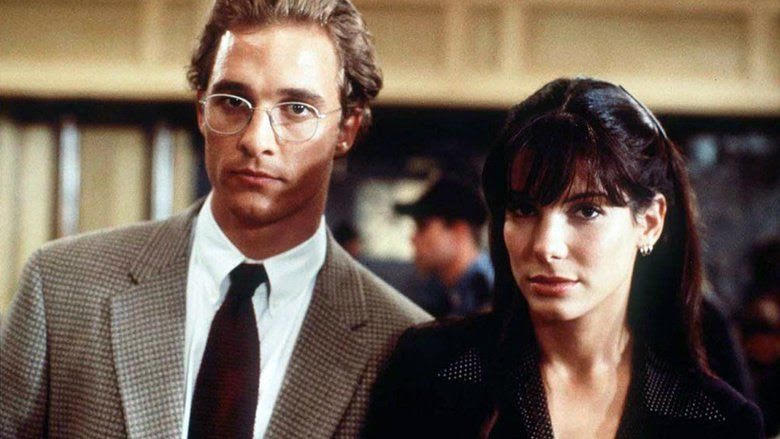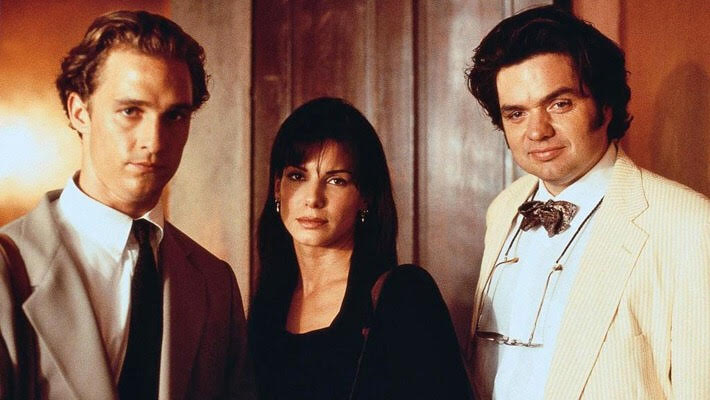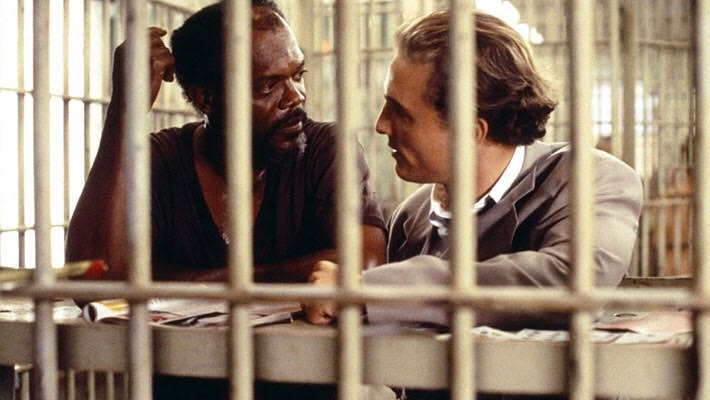A Time to Kill (1996)
written by: Akiva Goldsman
starring: Matthew McConaughey, Samuel L. Jackson, Sandra Bullock, Kevin Spacey, my dude Oliver Platt, and both Sutherlands (Donald and Kiefer)
It's insane that A Time to Kill exists in Joel Schumacher's filmography right in-between two broad, colorful, outsized and outlandish Batman movies. Because for it's few outlandish touches and outsized characters, A Time to Kill is a remarkably restrained and controlled film. It's generally thoughtful, emotive, and genuine. Overall it's a patient and sensitive film, impressively worked to pull emotions from a predictable plot.
A second Grisham adaptation for Schumacher, A Time to Kill feels like the legal drama I wanted from the less successful The Client. It delivers on the courtroom drama I had missed while simultaneously hitting the emotional beats of it's characters. The Client stands on the shoulders of Susan Sarandon; A Time to Kill spreads it's weight around. It seems like Joel learned a lesson or two-- or perhaps was simply working with better material.
A Time to Kill was Grisham's first novel, The Client his fourth. Every author has one excellent story in them, some have many more than that. I haven't read a lot of Grisham, so maybe I can't really judge here, but I've seen quite a few films based off his work and I'm willing to say (as with many best selling authors who operate in a specific genre) that there may be a case of diminishing returns. A Time to Kill has a certain narrative punch, based off this movie adaptation (written by our familiar friend Akiva Goldsman), and a crispness of action that The Client lacks. This isn't The Firm, Grisham's second novel and source for a pretty stellar Tom Cruise movie, but it's strong in many ways. Some elements of the story felt a little oversized for me-- much of the vitriolic KKK plot, for example-- but that's part of the world that Grisham is writing in and it's part of the story he's telling.
You wouldn't know it from the film, which feels timeless in a sweaty Southern summer kind of way, but it's set in 1984, a full ten years before the release of this movie. I was only six when this movie came out, and my understanding of the state of race relations in the south at that time is, uh, lacking. So perhaps that's why the more extreme aspects of this movie rang a little false to me. Maybe it just doesn't jive as well with the subdued courtroom drama at play. The threat of murder at the hands of white supremacists was less engaging than the genuine tension of testimony and jury reactions.
It is, genuinely, a tense film. Schumacher turns up the tension from moment one, bringing in the sweat drenched anxiety he used to such good effect in Falling Down. Do not be fooled into considering that everyone in this film is not Very Sweaty, because they are, constantly. Sweaty and bathed in oranges and reds, a continual heat that sits as an oppressive weight over the movie. The heat becomes a haze, which lends the visuals a soft, gauzy texture-- but that gauze doesn't soften the content or themes, which I applaud.
The film opens with an assault on a ten year old girl by two adult men, and for a long time we watch these two men, crass and cruel, aggravate a local community, putting everyone on edge. We also watch a young girl go about her little grocery shopping, start her walk home along a dusty country road. Because you've bought a ticket to the movie, you know that something bad is going to happen, but the heightening of tension as to when and how bad and how much you're going to see is very well done. You wait, heart in your throat, until the attack occurs, and when it does, it's an explosive bit of violence. It comes from the girl's point of view, frantic and frightening and horrible. Immediately, as the movie will ask us to be again and again, we are in this child's shoes. The men rape her and beat her, and leave her for dead.
Quickly the men are arrested, and while their guilt isn't in doubt, the major factor at play has not yet here been mentioned-- the assailants are white, the victim black. The question arises: is it possible for this girl to have justice through the law under these circumstances, in this place, in this time?
This opening sequence is intercut with the introduction of Matthew McConaughey as Jake Brigance, a young lawyer in this small southern town and the protagonist of this story. He's golden and young and handsome, and his life is tonally so effortless in comparison. Jake has a wife, a kid, and a legal practice that's struggling after his boss and mentor, Lucien Wilbanks (Donald Sutherland, having a side of fun with his entree of dignity), was disbarred for being a drunk. Doesn't make him a bad guy, but there it is. Jake is a man of gentle nobility and morality, who takes cases to help people-- unlike his friend Harry Vonner (Oliver Platt, extremely dreamy in white suits, suspenders, pointed sideburns and red-lensed sunglasses), who has sold out into corporate law. For his part McConaughey delivers a pretty nice performance. Not fully in drawling McConaughey mode, he's also clearly taking advantage of an opportunity for a big break. He doesn’t always read “smart” on camera, but here he’s certainly believable as a small town lawyer with some brains in his pretty head— and perhaps more importantly, quite a heart in his pretty chest. While there are plenty of scenes that McConaughey underplays effectively or cedes focus to his scene partners, there are also quite a few that he uses to show off a little, by which I mean weeping and growling and gritting his teeth. It's not always to his discredit that he turns up the emotion-- this is something of a sentimental movie, and as such, high sentiment is occasionally required.
The film at large mirrors McConaughey's performance-- for every underplayed and nuanced moment, there's something overly dramatic. Most of this comes straight out of Grisham, and the film can't be blamed for sticking to the content of the book upon which it's based.
The main action of the film comes not from the trial of these two white rapists, but rather when the father of the victim, Carl Lee Hailey (Samuel L. Jackson, in a genuine star turn), takes justice into his own hands. In a sequence that absolutely works, Carl Lee scopes out the courthouse, lit in stark shadows and half hidden. There's a beautiful overhead shot of Carl Lee standing at the edge of the inlaid seal. The following day, that seal is splashed with blood when Carl Lee kills his daughter's rapists, and in the process accidentally injures a court officer (Chris Cooper! That very minor role is played by Chris Cooper!!!). It plays as a piece of dramatic ballet-- all silence and gunshots and dramatic music. It's effective, and in classic Schumacher style, spends a lot of time watching the faces of the people involved. This extends to the aftermath, where Schumacher allows a quiet scene of McConaughey returning home to his family, stained with blood, where he cries on his porch. As ever, Schumacher trusts his actors to deliver, and gives the scene the long moment it needs, and McConaughey one long take to deliver it in. This is the type of work I like best from Schumacher-- the patient moments with actors-- and A Time to Kill is honestly full of them. Moved by the actions of this grieved father, Jake agrees to defend Carl Lee in court.
This first act of vengeance creates a burgeoning cycle of revenge, as the brother of one of the killed rapists steps into the light of the film to fuck things up. This brother is played by Kiefer Sutherland with a curled lip and dead eyes, doing some showy work as a truly horrible person. This character, who's name I never caught and did not need to catch, because it's Kiefer and his character might as well be called "Oh This Asshole Again", calls up the local chapter of the KKK and stirs up heavy racist sentiment everywhere he goes. Every time he showed up on camera to do another horrible, racist thing, I found myself grumbling aloud, "oh goddamnit."
It is this part of the movie, the plotline with Kiefer and the KKK, that I found to be a little heavy handed. We all agree racism is bad, and I'm not sure the movie really needs to show us more of how racism is bad. Our heroes think outward racism is bad, the movie thinks racism is bad, and so on and so on. It feels sickly indulgent to show KKK rituals. It's appropriately chilling as presented, verging on genuinely upsetting, but I'm not sure the story gains much by having this ugliness in it. However, it is straight out of Grisham, so snipping it out completely would be a bold adaptive move. In many ways, especially towards the end, the movie is making a statement about ingrained racism, not explicit racism, and so this explicitly racist subplot doesn't add much for me. In fact, it almost overshadows and undercuts the better, more nuanced themes at play. It does add some physical danger to the proceedings, and to Jake and his teams involvement in the case, but is that necessary to care about the story and characters? Isn't it stakes enough that Carl Lee will go to prison for life (if not to the chair), for a crime of passion in defense of his young daughter? I think it is. The outcome of the trial has more real tension and importance to me than the physical danger of the KKK, or of Kiefer's eventual personal acts of vengeance. For a two and a half hour movie, I wouldn't have minded trimming some of this down.
Also to be trimmed is a weird adultery subplot, when Sandra Bullock as Ellen Roark (first billed, which is impressive for how small her role is) comes to town to assist Jake in his defense of Carl Lee. She's very smart, intuitive, and Bullock is dynamic in the role. Roark is also very pretty, and a lot of what she has to do in this story is flirt with Jake and occasionally providing a crucial legal tactic. She's not particularly well drawn beyond that, and the reason as to why she's taken it upon herself to help with this particular case is never very clear. And Jake has a wife and a daughter, so any flirtation with Roark is... you know... bad.
For most of the movie, I kept thinking, "Why even have the wife and kid?" Why have them if they stand mostly as an impediment to the near affair between Jake and Roark? Bullock and McConaughey have good chemistry, why not just let Jake and Roark kiss? It comes down to the final moment of the movie-- the wife and kid must be in the movie so that Jake's daughter and Carl Lee's daughter can play together. Thus, we overcome the racism bred into us by our surroundings. Forward progress. Har har. It's heavy, and forced, but yet! Effective. It's nice! It's nice to see that line, tossed away in the midst of a speech full of better lines, paid off.
Speaking of the speech full of better lines-- I would say that if A Time to Kill has a good reputation, or any reputation at all, it must come down to two speeches towards the end of the movie. The trial has gone on, and it doesn't seem to be going particularly well for the defense. The prosecution, led by the local D.A. (a semi-slimy Kevin Spacey), has done their job well. As much as the movie is firmly on Carl Lee's side of things from the get go, it gives a fair shake to the prosecution. Murder, even in circumstances such as these, is wrong. There is no "justifiable homicide." The arguments are well made, but there's no push and pull within the audience. You want Carl Lee to be set free, and the worry he might not be, especially as the trial drags on, starts to weigh. As things start to come to a close, Jake and Carl Lee have a scene together in jail, where Carl Lee explains why he wanted Jake as a lawyer-- "You're my secret weapon," Carl Lee says, "because you're one of the bad guys." By being white, and well off, Jake has an insight into Carl Lee's white, well off jury. A necessary one. "You see me like they see me." It's vital that Jake is made aware of his own privileged perspective. This speech could come across as grand-standing, and preachy, but Jackson delivers it perfectly, with earnestness and simplicity. Not like a speech at all. Within the scene, Schumacher frames Jake and Carl Lee separated by the bars of his cell, visual keeping them apart, even as they sit in the same room. This scene genuinely works. Two actors firing on all pistons, delivering good, straightforward dialogue.
The second speech of note is Jake's summation at the end of the trial. He describes the horrors enacted upon Carl Lee's daughter, in gruesome detail, and finishes with a line that shouldn't work, but miraculously, absolutely does: "Now imagine she's white." It's so stark, it's a slap in the face. It shouldn't work. It's so cheesy, in a way, and delivered and contextualized with such a punch as to elicit a gasp whether you feel it or not. But I genuinely did gasp-- the audacity it takes to straight out say that struck me perhaps more than the concept behind the line itself. Schumacher has followed McConaughey's face through his long speech, and after that final pronouncement the court house rings with silence. Schumacher provides amazing reaction shots-- from Kiefer scowling in the back of the courtroom to Donald Sutherland proudly nodding, to Carl Lee's wife, to extras we've never seen before. It's those faces that make it work, most of all. The faces of people like us, like the jury, taking this all in. And then, pow, "Imagine she's white." I'd say that's good filmmaking. The scenes after, including Carl Lee’s triumphant acquittal, are a sharp denouement from that somewhat remarkable moment.
Overall, maybe there's just a little too much going on-- Jake's house is burnt down! There's a riot! Roark is kidnapped! It's a lot on top of the courtroom drama, which is dramatic enough. All the best scenes happen divorced from the KKK activity. This is a script issue more than anything, and a source material issue. In a book you have all the time in the world for things like that. The movie fails to keep up the energy in these more outlandish sequences, like Schumacher knows it's sortof silly and can't devote as much energy to it as he can to the quieter, more emotionally weighty scenes.
So what’s the final conclusion here? The movie is good, it works, it’s more effective than it has any right to be. The performances are uniformly strong, even when they’re heavy handed or overwrought. The final product is a remarkably successful movie.
It’s not, however, a life changing movie. It’s not particularly striking, and I don’t expect to revisit it soon. What sticks with me now, a solid week after watching it, is mostly Oliver Platt’s look and charisma, Samuel L. Jackson’s tough and powerful performance, and a moment where Donald Sutherland tells Matthew McConaughey, “Don’t be me. Be better than me.” He underplays it— not a declaration but a sad acknowledgement— and I felt that might be the real lesson I took from the movie. The heavy race lessons are good and important, but for me, now, perhaps the lesson I needed was about constant forward progress. Don’t be me. Be better than me. We must all be better than our forebearers. Or that must be the goal, at least. Be better, do better. Make the world a better place however you can, so our children can play together.
That’s not half bad.
Overall: ★★★★
Schumacherness: ★★
Up next: Batman & Robin (1997)





